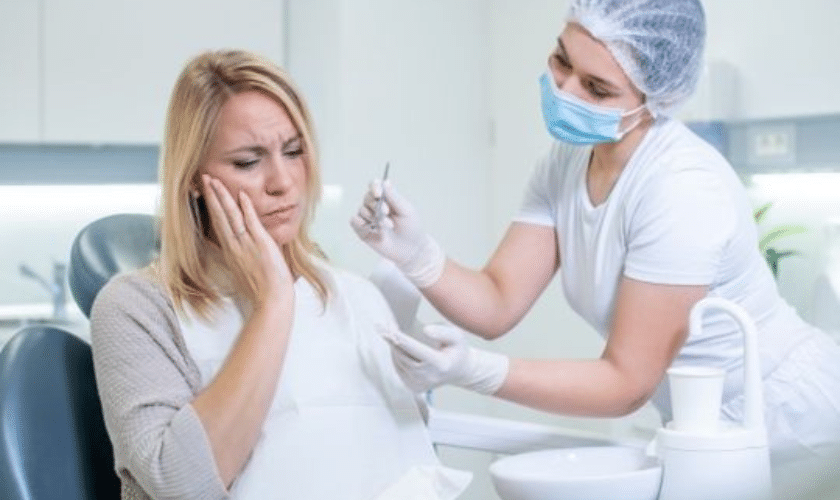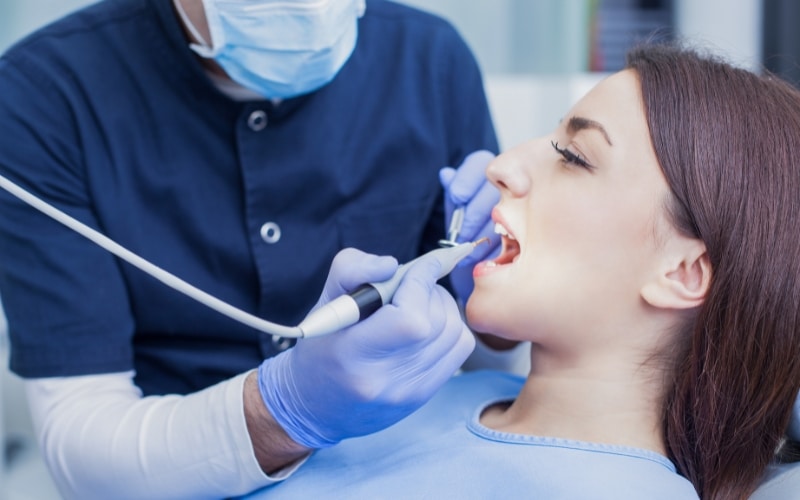ONLINE SCHEDULING AND VIRTUAL CONSULTS AVAILABLE

Bleeding Gums After an Injury: Is it Serious? When to Seek Emergency Dental Attention

A knock to the mouth during a fall, a stray elbow in a basketball game – facial injuries are a common occurrence, especially during active lifestyles. While a bloody lip or chipped tooth might be the first things that come to mind, bleeding gums can also be a consequence of such mishaps. But should you be worried? Is it a sign of something serious? The truth is that bleeding gums after an injury can range from a minor annoyance to a potential indicator of a more significant issue. This blog post will delve into the world of bleeding gums, exploring the causes and the potential seriousness. Also, this blog will explore when to seek emergency dental attention. We’ll also provide some handy home remedies and tips for a speedy recovery.
Why Do Gums Bleed After an Injury?
Gums, the delicate pink flesh surrounding your teeth, play a vital role in keeping your smile healthy. Richly supplied with blood vessels, they provide essential nourishment to your teeth and act as a barrier against infection. However, this abundant blood flow also makes them prone to bleeding, even with minor injuries. Here’s a breakdown of common reasons why your gums might bleed after an incident:
Direct Trauma: A blow to the face or mouth can directly damage the gum tissue. Imagine a fall, a sports accident, or even biting down on something unexpectedly hard. The force can cause the gums to tear and bleed. Depending on the severity of the impact, you might experience swelling, redness, or even loose teeth alongside the bleeding.
Loose Tooth: If an impact loosens a tooth from its socket, the surrounding gum tissue can become inflamed and bleed. This inflammation is the body’s attempt to heal the injured tissues around the tooth. A loose tooth is often accompanied by pain and sensitivity, especially when you bite down. This is because the tooth’s supporting structures are compromised.
Dislodged Tooth: In more serious cases, a forceful impact can completely knock a tooth out of its socket. This can lead to significant bleeding from the empty socket, which is directly connected to your bloodstream. A dislodged tooth requires immediate dental attention to try to preserve it. Time is of the essence in such situations.
Foreign Object Intrusion: Sometimes, a tiny piece of food or debris can become lodged between your tooth and gum. This unwelcome visitor can irritate the gum tissue, causing inflammation, discomfort, and sometimes, bleeding. The bleeding might not stop until the foreign object is removed. If you suspect something is stuck, try gently flossing or rinsing with water to dislodge it. If unsuccessful, consult a dentist.
Beyond Injury: Other Causes of Bleeding Gums
While a bump or scrape in your mouth can cause bleeding gums, it’s not the only culprit. Here’s a deeper dive into some underlying reasons your gums might be bleeding:
Gum Disease
Gum disease covers two stages: gingivitis and periodontitis. Gingivitis is the early warning sign, characterized by inflamed and irritated gums. It’s often reversible with improved oral hygiene. A hallmark symptom of gingivitis is bleeding, especially when brushing or flossing. Also, plaque builds up at the gum line. If not removed through regular brushing and flossing, plaque hardens into tartar (calculus). This tartar irritates the gums, causing inflammation and bleeding.
Also, if gingivitis goes untreated, it can progress to periodontitis, a severe gum infection. Periodontitis damages the tissues and bones that support your teeth. This can lead to deeper pockets forming between the teeth and gums, which trap more plaque and bacteria. In severe cases, periodontitis can even lead to tooth loss.
Vitamin Deficiencies
Certain vitamins play a crucial role in gum health. Deficiencies in vitamin C and K can make your gums more fragile and prone to bleeding.
- Vitamin C: This vitamin is essential for collagen production, which is a key component of healthy gums. Without enough vitamin C, your gums become weak and susceptible to damage and bleeding. Scurvy, a severe vitamin C deficiency, can cause bleeding gums, loose teeth, and even jaw problems.
- Vitamin K: This vitamin helps your blood clot properly. A deficiency in vitamin K can make it harder for your body to form clots, increasing your risk of bleeding, including from your gums.
So, When Should You Worry About Bleeding Gums After an Injury?
Now that you’ve explored the reasons behind bleeding gums, let’s delve into the crucial question: When does it become a cause for concern and warrant a visit to an emergency dentist in Sunrise, FL? Here are some warning signs that shouldn’t be ignored:
Excessive Bleeding
If, despite applying constant pressure with a clean cloth for a good 10 minutes, the bleeding shows no signs of stopping, it’s time to seek emergency dental attention. This prolonged bleeding could indicate a deeper injury or underlying condition that requires professional intervention.
Loose or Knocked-Out Tooth
Did your injury loosen a tooth, or worse, completely knock it out? Don’t delay! Every minute counts when it comes to saving a tooth. An emergency dentist in Sunrise, FL, can assess the damage and take steps to try and preserve the tooth. The sooner you get to the dentist, the better the chances of success.
Severe Pain
While some discomfort after a mouth injury is understandable, intense, throbbing pain radiating through your mouth or jaw alongside bleeding gums is a red flag. This could signal a fractured jaw, damaged tooth nerve, or other serious complications requiring immediate dental care. Don’t hesitate to seek professional help to alleviate the pain and address the underlying issue.
Visible Signs of Infection
Keep an eye out for symptoms like swelling, redness, or pus formation around the injured gum area. These are telltale signs of an infection brewing beneath the surface. Early intervention by an emergency dentist in Sunrise, FL, is crucial to prevent the infection from spreading and causing further damage.
Trust Your Gut
If something feels off in your mouth following an injury – persistent pain, strange bumps, lingering sensitivity – don’t hesitate to schedule a visit with your dentist for a professional checkup. Early detection and treatment can prevent minor problems from snowballing into bigger issues.
What to Do Until You See a Dentist
While waiting to see your emergency dentist, here are some steps you can take to manage bleeding gums after a minor injury:
- Apply Gentle Pressure: Use a clean gauze pad or a folded tissue to apply gentle but firm pressure directly on the bleeding area for 10-15 minutes. This will help control the bleeding.
- Cold Therapy: Apply a cold compress (wrapped in a towel) to the outside of your cheek or jaw to reduce swelling and alleviate any discomfort.
- Saltwater Rinse: Prepare a warm saltwater rinse by dissolving 1/2 teaspoon of table salt in a glass of warm water. Swish gently for 30 seconds and spit. This helps clean the area and promote healing.
- Over-the-counter Pain Relief: Over-the-counter pain relievers like ibuprofen or acetaminophen can manage any pain.
Bleeding gums after an injury can be a cause for concern, but it doesn’t always necessitate a trip to the emergency dentist. By understanding the severity of your bleeding and any accompanying symptoms, you can make an informed decision about seeking professional care. Remember, your oral health is vital to your overall well-being. When in doubt, err on the side of caution and seek professional help. So, if you’re looking for a trustworthy emergency dentist in Sunrise, FL, visit us at My Dentist for Life, and we’ll promptly address your oral issue with care and concern. Call us today!





